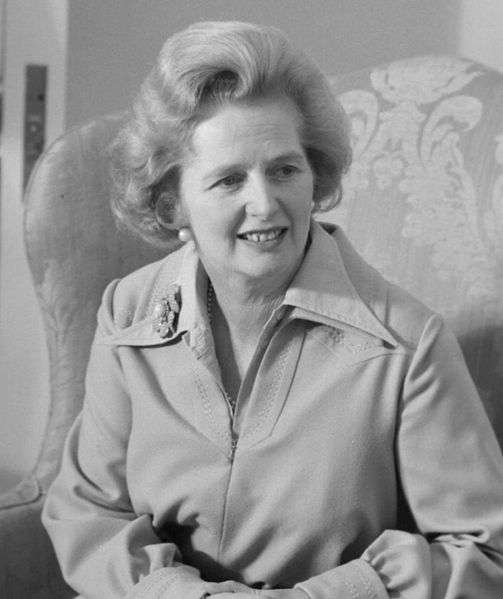 CFN – The news of the death of Margaret Thatcher is not, at her age and in the condition that she has been in for some years, a great surprise or entirely sad. But in contemplation of the great career she had and the immense service she rendered the United Kingdom and the Western world, it is overwhelmingly sad. In general, Britain’s greatest prime ministers have served successfully in wars with other Great Powers: Both William Pitts (in the Seven Years’ and Revolutionary and Napoleonic Wars, the first two real world wars), Lord Palmerston in the Crimean War, and David Lloyd George and Winston Churchill in the Great War and the Second World War. Robert Walpole, Robert Peel, John Russell, Benjamin Disraeli, William Ewart Gladstone and the Marquess of Salisbury are also generally reckoned to be great prime ministers, either as stylish survivors like Walpole and Salisbury or great reformers, and especially if their accomplishments were leavened with a tremendous wit, parliamentary legend and a literary cache, as Disraeli’s and Churchill’s were.
CFN – The news of the death of Margaret Thatcher is not, at her age and in the condition that she has been in for some years, a great surprise or entirely sad. But in contemplation of the great career she had and the immense service she rendered the United Kingdom and the Western world, it is overwhelmingly sad. In general, Britain’s greatest prime ministers have served successfully in wars with other Great Powers: Both William Pitts (in the Seven Years’ and Revolutionary and Napoleonic Wars, the first two real world wars), Lord Palmerston in the Crimean War, and David Lloyd George and Winston Churchill in the Great War and the Second World War. Robert Walpole, Robert Peel, John Russell, Benjamin Disraeli, William Ewart Gladstone and the Marquess of Salisbury are also generally reckoned to be great prime ministers, either as stylish survivors like Walpole and Salisbury or great reformers, and especially if their accomplishments were leavened with a tremendous wit, parliamentary legend and a literary cache, as Disraeli’s and Churchill’s were.
Margaret Thatcher conducted only a secondary war (the Falklands), as Salisbury did (against the Boers), but she conducted it extremely well and to the ultimate benefit of the enemy, as Argentinian democracy, whatever its limitations, resulted from the British rout of the Ruritanian and brutal junta that lumbered out of the Buenos Aires Officers’ Club in their over-bemedalled tunics to oust the nightclub singer who was the widow and successor of Juan Peron in 1976. But as a reformer, who changed the country for the better, she easily surpassed any of the others, and she served longer than any consecutively, 11 years, since the First Reform Act in 1832 broadened the electorate and democratized the constituency system. In these 180 years, only Gladstone in four separate terms and a parliamentary career spanning 63 years, and Salisbury, scion of Britain’s most exalted family (the Cecils), and chosen heir of Disraeli, in three terms, served longer than Margaret Thatcher, the daughter of a provincial grocer.
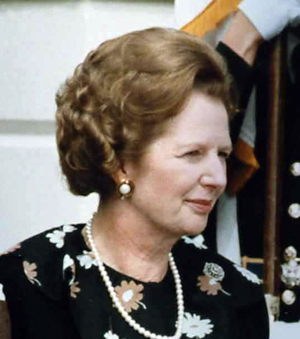 It has been a disservice to her great achievements that Margaret Thatcher has been torn down by the left, ungratefully deserted by her own party, and had her privacy violated by vulgar snobbery and snide cinematography (even if somewhat redeemed by the thespian artistry of Meryl Streep). Not too much should be read into the confused defection of the Conservative Party from the legacy of the only person in 180 years who has led them to three consecutive full-term election victories. The British Conservatives leave the selection and retention of leaders to the parliamentary party, and have knifed every leader they have had since Stanley Baldwin, who took a good look at the Nazis and retired in 1937, except those who retired before they could be disembarked. Neville Chamberlain, Winston Churchill, Anthony Eden, Harold MacMillan, Edward Heath, Margaret Thatcher and Iain Duncan-Smith were pushed out, and Alec Douglas Home, John Major, William Hague and Michael Howard retired before that indignity could be inflicted on them. Sharper by far than a serpent’s tooth is a British Conservative MP’s ingratitude.
It has been a disservice to her great achievements that Margaret Thatcher has been torn down by the left, ungratefully deserted by her own party, and had her privacy violated by vulgar snobbery and snide cinematography (even if somewhat redeemed by the thespian artistry of Meryl Streep). Not too much should be read into the confused defection of the Conservative Party from the legacy of the only person in 180 years who has led them to three consecutive full-term election victories. The British Conservatives leave the selection and retention of leaders to the parliamentary party, and have knifed every leader they have had since Stanley Baldwin, who took a good look at the Nazis and retired in 1937, except those who retired before they could be disembarked. Neville Chamberlain, Winston Churchill, Anthony Eden, Harold MacMillan, Edward Heath, Margaret Thatcher and Iain Duncan-Smith were pushed out, and Alec Douglas Home, John Major, William Hague and Michael Howard retired before that indignity could be inflicted on them. Sharper by far than a serpent’s tooth is a British Conservative MP’s ingratitude.
When Margaret Thatcher was narrowly elected prime minister in 1979 over James Callaghan, the United Kingdom was on daily audit from the International Monetary Fund; currency controls prevented the removal of more than a few hundred pounds from the country, top corporate and personal income tax rates were 80 and 98%, and those who had the temerity and persistence to enjoy a capital gain (which was hard to come by in Britain in that economic climate) were apt to enjoy the exaltation of soul generated by an effective tax rate of more than 100%. The entire economy was in the hands of an intellectually corrupt, Luddite trade union confederation, which chose most of the delegates to any conference of the governing Labour Party, and whose shop stewards and craft unit heads could shut down an entire industry in mid-contract for any reason, from an individual work grievance to the sour grapes generated by a poor round of darts in his local pub (on working hours).
Quotes
“Margaret Thatcher took a country that was on its knees and made Britain stand tall again. … She didn’t just lead our country, she saved our country.”
— David Cameron, Britain’s Prime Minister
“While many in positions of power are defined by the times in which they govern, Margaret Thatcher had that rarest of abilities to herself personify and define the age in which she served.”
— Stephen Harper, Canadian Prime Minister
“America has lost one of the staunchest allies we have ever known.”
— George H.W. Bush, former U.S. president
A “politician whose word had considerable weight.”
— Mikhail Gorbachev, the former president of the Soviet Union
“It’s a great day for all the miners.”
— David Hopper, the general secretary of the Durham Miners’ Association
“She was very considerate, and, surprisingly, touchy-feely. She would tap you on the arm and say, ’Everything OK?’ I hadn’t expected that touch of tenderness.”
— Salman Rushdie, whom Mrs. Thatcher granted protection when he went into hiding for The Satanic Verses.
“Margaret Thatcher was the most transformative leader of her country since Churchill.”
— Brian Mulroney, former prime minister
The Britain whose headship Margaret Thatcher had assumed (by the narrowest of margins) had not led a foreign military operation since the debacle at Suez in 1956, in which the British and French, by prearrangement and without consulting the United States, incited an Israeli invasion of the Sinai and then bunglingly invaded Egypt and masqueraded as peacekeepers separating the two combatants. Twenty-five years later the Argentinians invaded the Falklands and the British forcibly ejected them. Then, as always, Margaret Thatcher did not flinch. Nor did she when the Irish terrorists blew up her hotel at Brighton, killing several of her MPs, and she insisted that the conference open exactly on time the next morning and gave extemporaneously an unforgettable call to arms against the terrorists. Nor did she when as she cleaned up the state-owned industries and disemployed hundreds of thousands of under-worked beneficiaries of decades-old feather-bedding, and she was reviled in huge demonstrations. She did not waffle or waver over deployment of Intermediate nuclear missiles in Britain, Germany, Belgium and Italy to counter the Soviet ICBMs already in place in the satellite countries. When asked if she sought a “nuclear-free Europe,” she instantly replied that she favoured “a war-free Europe.”
When large chunks of her parliamentary party lost their nerve over her free market economics: a reduction of the top personal income tax rate to 40%, elimination of all currency controls and massive privatization of industry and right-to-work laws to remove the terror of the labour leadership, she famously told her party conference: “U-turn if you want; the lady’s not for turning.” She was a rock-solid supporter of the Western Alliance and was instrumental in the balanced elimination of intermediate-range missiles in Europe and the satisfactory end of the Cold War. She is generally credited with assisting President George Bush Sr. in determining that Saddam Hussein had to be evicted from Kuwait: “George, don’t wobble.” She made Britain the fourth economic power in the world, after the U.S., Japan and Germany, made her prosperous and a low tax country with declining public debt, improving public services, and steady trade surpluses. As she promised, she restored “Great” to Great Britain, it was, to scale, Elizabeth I’s Gloriana, without Shakespeare to publicize it, and with more than a trace of the Churchillian courage and virtue that first attracted her to a Conservative candidacy under Mr. Churchill’s leadership in 1950 and 1951.
She formed her judgment of Germany when the Luftwaffe, (in what must rank as one of the greatest long-term strategic blunders of the Second World War), bombed the town of Grantham where teenage Margaret Thatcher lived. And she formed her opinion of Americans from the U.S. servicemen, black and white, she and her family invited home for dinner after the war-time Sunday services in her local Methodist church. She was always grateful for America’s deliverance of the old world from the evils of Nazism and Communism, always supported the right of Israel to survive and flourish as a Jewish state, and never went cock-a-hoop for sanctions against what she called “the evil and repulsive” apartheid regime in South Africa, because she did not “see how we will make things better by making them worse.” She was a practical person of unswerving principle.
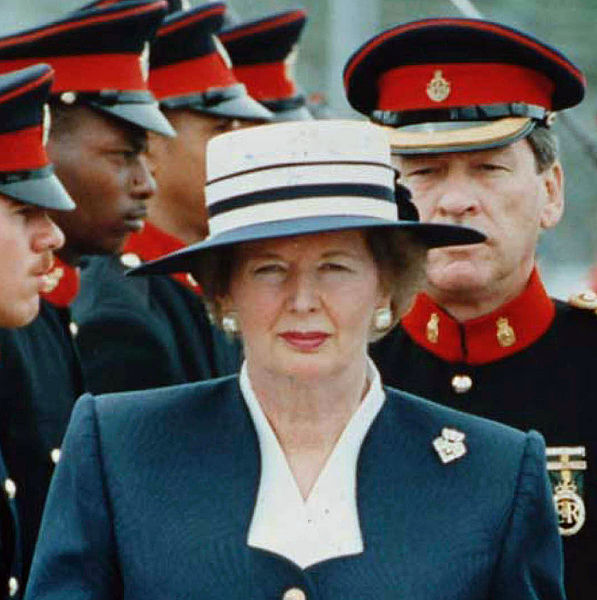 She was a strong woman, but never a mannish one. She was an Oxford alumna (in chemistry), when they were somewhat rare, a Tory candidate for Parliament, MP, and cabinet secretary when they were rare, the first woman leader of a major party in Britain, the first woman prime minister, and she assimilated this meritocratic rise, in the gritted teeth of hidebound British high Tory traditionalism, with neither diffidence nor triumphalism. When she became the leader of the party, she entered the Carlton Club, the Conservatives social headquarters in St. James, and when informed that ladies were not allowed in other than as guests, she replied as she brushed past the doorman: “They are now.”
She was a strong woman, but never a mannish one. She was an Oxford alumna (in chemistry), when they were somewhat rare, a Tory candidate for Parliament, MP, and cabinet secretary when they were rare, the first woman leader of a major party in Britain, the first woman prime minister, and she assimilated this meritocratic rise, in the gritted teeth of hidebound British high Tory traditionalism, with neither diffidence nor triumphalism. When she became the leader of the party, she entered the Carlton Club, the Conservatives social headquarters in St. James, and when informed that ladies were not allowed in other than as guests, she replied as she brushed past the doorman: “They are now.”
She often worried before speeches, feared greatly for British servicemen she sent into battle, in the Falklands and Iraq, and was never flippant or blasé about the human and historic consequences of important decisions she took. She was always strong, sometimes impatient, but never arrogant. While she was sometimes overbearing with colleagues and others who could stand up for themselves, she was always considerate of and exquisitely courteous to subordinates, and was beloved of the staff at Downing Street and Chequers.
Her successors have squandered most of the national economic strength and political capital she bequeathed to them. She was undercut and stabbed more in the back than the front by her own party, for advocating in respect of Europe precisely what the great majority of the British public now believes — that European co-operation is unambiguously good, but integration should be approached with caution by Britain, until it is not stripping institutions that have served it well for centuries in favour of well-intentioned but unfledged replacements.
Personally, it was a great honour that she (and Lord Carrington) sponsored me as a member of Their Lordships’ House, and that she and the magnificent Sir Denis Thatcher came to Barbara’s and my wedding party, and often to our home. When I was in London in the autumn, her advisers said that she was not reliably well enough to receive me, but they conveyed my best wishes at an appropriate moment and I cherish her warm and gracious reply. When she retired as prime minister the party chairman, Kenneth Baker, a loyal supporter, said “We shall not see her like again,” and she said “It’s a funny old world.” She was a saintly woman, and one of the great leaders who has arisen in a thousand years of British history.
Mr. Black graciously allowed CFN to reprint this piece that appeared originally in The National Post.
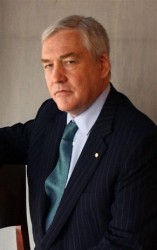 Conrad Moffat Black, Baron Black of Crossharbour, PC, OC, KCSG (born August 25, 1944) is a Canadian-born former newspaper publisher, an historian, a columnist, a UK peer.
Conrad Moffat Black, Baron Black of Crossharbour, PC, OC, KCSG (born August 25, 1944) is a Canadian-born former newspaper publisher, an historian, a columnist, a UK peer.
Mr. Black is also an author, having written two memoirs (A Life in Progress and A Matter of Principle) and biographies of Maurice Duplessis, Franklin Delano Roosevelt, and Richard Nixon.
(Comments and opinions of Editorials, Letters to the Editor, and comments from readers are purely their own and don’t necessarily reflect those of the owners of this site, their staff, or sponsors.)

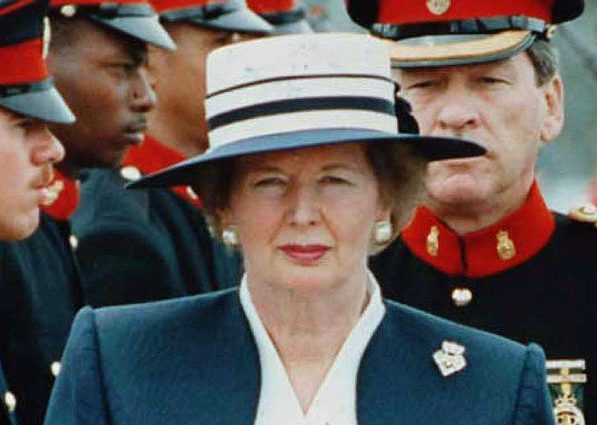
God Bless Margaret Thatcher, she will be remembered. Thank You Lord Black for your kind words.
Maggie was awesome.
A stirring eulogy indeed by a fellow Conservative, plutocrat, and convicted felon….including tributes from the likes of Mulroney and Harper.
Who could ask for anything more?
More than likely mining communities and families throughout the UK. Also the familiies of those who were injured in the demonstrations against the infamous Community Charge (aka poll tax)…which finished Mrs. Thatcher as PM. (Compare the police actions in London then with those at the G20 meeting in Toronto in 2010.)
Topping things off, Mr. Black calls Mrs. Thatcher a “saintly woman.”
What would Pope Francis from Argentina say to that?
Mr. Black gives a good rub to one side of a coin–the shiny side that shone on him.
What about the other side?
Baby-boomers worldwide will undoubtedly never forget the unflinching fortitude and sheer, unfettered, determination that were the foundation of British Prime Minister Margaret Thatchers transformation of Britain and indeed the entire world.
Defying the odds and ascending to the Leadership of the Conservative Party onward to the P.M.s residence, granted a majority government by a British populace languishing in economic malaise struggling with unsustainable, public-sector union and social infrastructure expenditures, the P.M. rose to the occasion as only she could.
The genesis of Thatchers 11.5 years in office commenced with gloomy, ravaging recession, with an ultra-high inflation rate of 18% that her government diminished to 3.9% by 1992 and with a stalling G.D.P. that her free-enterprise policies would soon re-ignite firing-up the economy with a momentum to reach its greatest potential. And just as they would balance the books at the family’s grocery store so if would be on the national frontier as Lady Thatcher finally reigned in skyrocketing annual deficits actually leaving Britain with 2 annual budget surplus’s in the final years of her stewardship something unthinkable when she came to office in 1980.
Clearly, the British people were just as worried about the emergence of an overwhelming adversary that the Russian bear had become, with the expansionist Soviet lead Warsaw Pact forces bordering Europe at the height of the Cold War, as they were consumed by the floundering economy. Faced with conventional ground forces over 3-fold that of the N.A.T.O. Alliance in concert with strategic, intermediate-range, multiple-nuclear-warhead SS20 missiles targeted at London, Bonn, and Paris within minutes of their target, serving as a pivotal first strike weapon for the U.S.S.R., the Iron Lady jettisoned the appeasement of past governments striking an unbreakable alliance with President Ronald Reagan that would check the Soviet threat once and for all.
Soviet troops were rolling into Afganistan in a brutal occupation and Thatcher and Reagan, drawing on the lessons of history, took a rudderless N.A.T.O. into overdrive mode accelerating conventional and nuclear arsenals on a trajectory that was certain to give a second thought to any Russian testing of the territory integrity of western Europe. Protesters stormed into the streets in western capitals around the world branding Thatcher and Reagan as war-mongers, yet they were unfazed, advancing ahead with the deployment of precision-striking Pershing II intermediate-range missiles in Europe countering the menacing SS20s that in harmony with Reagan’s S.D.I. (Strategic Defence Initiative-Star Wars) would after passing of a few Soviet leaders at last convince Politburo Chairman and General Secretary Gorbachev that they could do business.
Undoubtedly, it was the imposing presence of the Iron Lady that bridged a relationship between Reagan and Gorbachev which was crucial to in the achievement of the INF Treaty that was instrumental in eliminating and entire class of deadly intermediate-range nuclear weapons and in the CFE Treaty agreement reducing the conventional forces in Europe. Evidently, historians will link the tireless energies contributed by Thatcher to the US/USSR nuclear warhead stockpile reductions from 54 000 in 1980 to 13 000 today -less than 25% of inventories at the height of the Cold War.
While the British empire of earlier times was long gone, Thatcher restored national pride, demonstrating anhy invsion by the totalitarian Argentinians into the British colony of the Falklands would be repelled at any cost and a timid American Secretary of State named Alexander Haig wouldn’t dare to interfere with the war liberate the Falklands. And likewise in the pursuit of world peace the British Prime Minister had little patience with Canadian Prime Minister Trudeau’s and French President Mitterand’s lack of resolve and less than optimal contribution to N.A.T.O..
I always enjoyed Thatcher, Reagan, and Gorbachev, who were the stars of the show, on the satirical British puppet series Spitting Image that humourously depicted world leaders which produced majority of episodes while Margaret was in office. And the Press coverage of Thatchers cat Wilberforce revealed that her and her husband Denis always had good company at 10 Downing St just as the U.S. Presidents did with their dogs.
Lastly, on a personal note, I couldn’t help but shed a tear watching the outstanding Academy Award winning performance by Meryl Streep portraying Margaret Thatcher. It enlightening viewers in awe at the obstacles she overcame and the barriers she shattered in an era when Hollywood’s All in The Family depicted a woman’s place as in the kitchen, a phenomena Thatcher most certainly changed, as women swarmed into the job market as never before!
Today, when we look at Chancellor Angela Merkel, Prime Minister Julia Gillard, and the highest-polling 2016 Presidental Candidate Preference Hillary Clinton, we can witness the doors that the Iron Lady jammed open for a world with a more balanced representation of the populace in the corridors of power.
@ David C. Searle
An impressive tribute, for sure (in spite of lamentable spelling). Try sharing it with the thousands of British working families destroyed by Mrs. Thatcher’s anti-union policies; with Nelson Mandela, whom she called a “terrorist;” with all the families who lost sons and daughters in the jingoistic overkill known as the Falklands War; with the women she didn’t appoint to her cabinet.
As quote/epitaph of the day (the month? the year? the age?), here is Alladin Versi’s letter from Nanaimo B.C. in today’s Globe and Mail:
“The Iron Lady is gone. May she rust in peace.”
Margaret Thatcher was a very strong leader and one that you do not come across very often nowadays. RIP you earned your sleep.
She brought back what was once great in Great Britain.
[When she became the leader of the party, she entered the Carlton Club, the Conservatives social headquarters in St. James, and when informed that ladies were not allowed in other than as guests, she replied as she brushed past the doorman: “They are now.”]
Sometimes harsh, at times generous; the British have always stood stoic when compared to the other great empires of human history including that of Rome, Greece, France and even the United States.
They don’t make them like her anymore.
This was an interesting guest piece that generated comments from mostly new readers covering opposing sides of the question.
An excellent initiative!
@ Neil Macmillan
Agree – well said.
For a UK perspective, check this link with the much respected Guardian newspaper:
http://www.guardian.co.uk/commentisfree/2012/jan/04/margaret-thatcher-state-funeral-protests